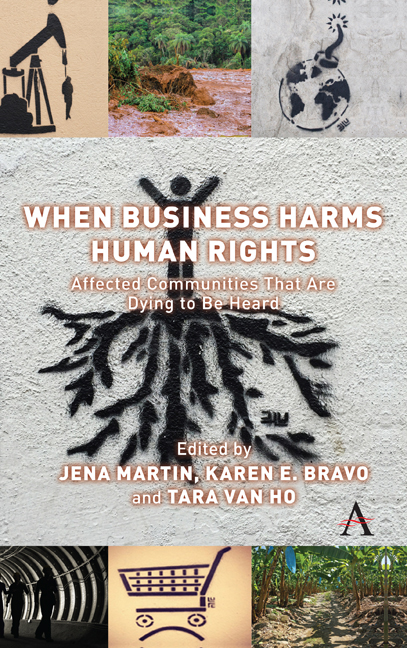Book contents
- Frontmatter
- Contents
- Preface
- Acknowledgements
- Introduction
- Chapter 1 Complicity in False Arrest, Imprisonment and Theft by a Fairtrade-Certified Company
- Chapter 2 Hindrances to Access to a Remedy in Business-Related Cases in Colombia: The Case of Gilberto Torres
- Chapter 3 The Global Pursuit for Justice for DBCP-Exposed Banana Farmers
- Chapter 4 The Rupturing of the Dam and the Community’s Social Fabric: A Testimony from an ‘Atingido’ from Bento Rodrigues, Brazil
- Chapter 5 Taming the Dragon, Unpacking Options for Access to Remedy for Violations by Chinese Multinational Corporations Operating in Chiadzwa, Zimbabwe
- Chapter 6 Máxima Acuña: The Story of How a Business Impacted Human Rights Defenders
- Chapter 7 Community Interrupted, ‘Life Projects’ Disrupted: Cajamarca, Ibagué, and the La Colosa Mine in Colombia
- Chapter 8 Occupational Health as a Human Right: A Case Study in a Turkish Free Trade Zone
- Chapter 9 The Price of the ‘Black Dollar’: Veteran Coal Miners and the Right to Health
- Chapter 10 Abandoned: A Tale of Two Mine Closures in South Africa
- Conclusion
- Appendices
- List of Contributors
- Index
Conclusion
Published online by Cambridge University Press: 20 January 2022
- Frontmatter
- Contents
- Preface
- Acknowledgements
- Introduction
- Chapter 1 Complicity in False Arrest, Imprisonment and Theft by a Fairtrade-Certified Company
- Chapter 2 Hindrances to Access to a Remedy in Business-Related Cases in Colombia: The Case of Gilberto Torres
- Chapter 3 The Global Pursuit for Justice for DBCP-Exposed Banana Farmers
- Chapter 4 The Rupturing of the Dam and the Community’s Social Fabric: A Testimony from an ‘Atingido’ from Bento Rodrigues, Brazil
- Chapter 5 Taming the Dragon, Unpacking Options for Access to Remedy for Violations by Chinese Multinational Corporations Operating in Chiadzwa, Zimbabwe
- Chapter 6 Máxima Acuña: The Story of How a Business Impacted Human Rights Defenders
- Chapter 7 Community Interrupted, ‘Life Projects’ Disrupted: Cajamarca, Ibagué, and the La Colosa Mine in Colombia
- Chapter 8 Occupational Health as a Human Right: A Case Study in a Turkish Free Trade Zone
- Chapter 9 The Price of the ‘Black Dollar’: Veteran Coal Miners and the Right to Health
- Chapter 10 Abandoned: A Tale of Two Mine Closures in South Africa
- Conclusion
- Appendices
- List of Contributors
- Index
Summary
If a tree falls in the forest does it make a sound? If a business commits a human rights abuse does it lead to remedies? To protections? Will the practices stop if the victim's voices aren't heard?
This edited volume represents a collective effort among scholars, practitioners and affected communities and individuals to give voice to many who have, up until now, not been able to be heard. Whether by recounting the struggles of individual human rights defenders or organized communities, the primary purpose of this book – since its conception – has been to ensure that some of those whose conduct has been impacted by businesses have an outlet to express their frustration, their outrage or their hope, as the case may be. Our task in this conclusion is to coalesce many of the themes that were explored by the individual contributors into an overarching exploration of what their struggles can foretell about the business and human rights agenda. To that end, we have organized our conclusion as follows.
First, we relate the narratives reported and analysed in the preceding chapters to other business and human rights narratives recently covered in the media. Next, we provide a superficial/high-level description of the field of business and human rights while questioning whether the purpose of this edited volume has been fulfilled. Then, we address some of the major themes evoked by the narratives. Finally, we end by offering our thoughts on possible ways to improve the protection of the human rights of individuals and communities affected by businesses.
The narratives contained in this volume are a small subset of the stories about businesses’ impacts on individuals and communities and yet, a cursory review of today's headlines show just how timely the stories contained in this volume actually are. For instance, as we write this conclusion, we have been struck by four recent media stories that evoke business and human rights issues.
1. The BBC runs a story about the past and present of human rights abuses in the early twentieth century rubber extraction industry in Cameroon: European society was outraged by photographic and narrative depictions of the methodologies used to extract higher rubber production from villagers – the death and/or mutilation of workers’ wives and children.
- Type
- Chapter
- Information
- When Business Harms Human RightsAffected Communities that Are Dying to Be Heard, pp. 201 - 212Publisher: Anthem PressPrint publication year: 2020

